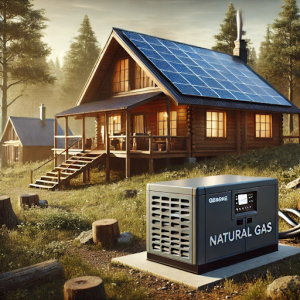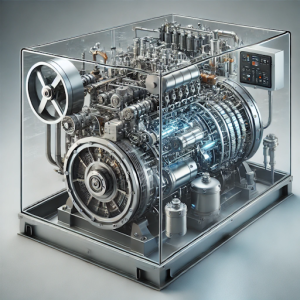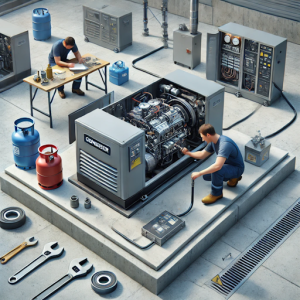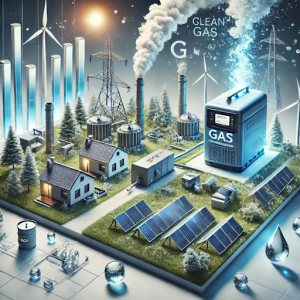Explore the Benefits of Natural Gas Generators for Sustainable Off-Grid Living
Natural gas generators present a superior option for those seeking a reliable power solution for their homes or remote cabins. Understanding the different methods of power generation is crucial for embarking on a successful off-grid journey. The distinctive advantages of natural gas generators—such as their reliability, cost-effectiveness, and eco-friendly features—make them an appealing choice for off-grid enthusiasts dedicated to sustainability and energy efficiency. By opting for this energy source, you can guarantee that your electricity needs are met while upholding your commitment to environmental responsibility.
In the current technology-driven era, the allure of off-grid living has garnered significant interest. Motivations for this lifestyle shift can range from a deep-rooted desire for sustainability and autonomy to the pursuit of a self-sufficient existence. Disconnecting from traditional power supply systems offers a rewarding way to live. Off-grid energy solutions empower you to utilize renewable sources or alternative fuels, creating a comfortable living space independent of conventional electricity networks.
Equipping yourself with comprehensive knowledge and adequate preparation is paramount for seamlessly incorporating a natural gas generator into your off-grid lifestyle. This approach ensures that your essential needs are consistently met with a dependable power source. In this article, we will explore the many benefits of natural gas generators, detail their operational mechanics, and outline essential considerations for their selection and installation, all aimed at enhancing your off-grid experience.
 Maximize Your Off-Grid Power Strategies with Essential Insights
Maximize Your Off-Grid Power Strategies with Essential Insights
- Utilizing off-grid power solutions liberates you from traditional energy dependencies, making them essential for remote living and during unanticipated outages.
- Natural gas generators provide reliable and efficient energy production, with significantly lower emissions compared to diesel or gasoline alternatives, promoting a cleaner environment.
- These generators function by combusting natural gas to generate mechanical energy, which is subsequently converted into electrical energy through a generator system, ensuring a steady power supply.
- When choosing a natural gas generator, it is crucial to evaluate factors such as power output, fuel efficiency, and maintenance requirements to ensure optimal functionality and longevity.
- Proper installation and regular maintenance are vital for the safe and efficient operation of your natural gas generator, preventing potential issues and enhancing performance.
Discover the Key Advantages of Natural Gas Generators for Reliable Energy Solutions
A prominent feature of natural gas generators is their exceptional reliability. By selecting a natural gas generator to fulfill your off-grid energy requirements, you can depend on a consistent power supply tailored to your specific needs. Unlike solar panels or wind turbines, which can be adversely affected by inclement weather, natural gas generators deliver a reliable energy output, ensuring you have power exactly when you need it.
This reliability is crucial for those who depend on electricity for vital functions such as heating, refrigeration, or operating essential medical devices. The assurance that your generator will provide power when required instills a sense of security. In addition, natural gas generators typically offer substantial cost savings when compared to other available options.
Although the initial investment might be higher than some alternative off-grid solutions, the long-term savings can be significant. Natural gas is often more economical than gasoline or diesel, leading to reduced operational costs over time. Moreover, the maintenance needs for natural gas generators are generally less intensive than those for other fuel types, allowing you to save both time and resources while enjoying a dependable power source.
 Comprehending the Operational Mechanics of Natural Gas Generators
Comprehending the Operational Mechanics of Natural Gas Generators
Natural gas generators operate by converting the chemical energy contained in natural gas into electrical energy through a combustion process. When the generator starts, natural gas is mixed with air and ignited within the combustion chamber of the engine. This ignition generates high-pressure gases that move the engine’s pistons, ultimately turning the rotor of the generator and producing electricity.
This operational method is notably efficient, as it is cleaner compared to other fossil fuel alternatives. A vital component of a natural gas generator is its fuel system, which commonly features a regulator to control gas flow and ensure optimal performance. Modern natural gas generators are equipped with advanced features such as automatic start/stop functions and remote monitoring capabilities.
These innovative functionalities greatly enhance user convenience, empowering you to manage your power supply more effectively and improve your overall off-grid lifestyle.
Essential Factors to Consider When Choosing Your Ideal Natural Gas Generator
| Consideration | Description |
|---|---|
| Power Output | Evaluate the generator’s required power output based on the appliances and equipment you intend to operate. |
| Fuel Type | Opt for natural gas as your fuel choice for its clean-burning and cost-effective properties. |
| Size and Portability | Select a generator size and portability level that suit your available space and mobility needs. |
| Noise Level | Assess the noise output of the generator to ensure it meets the acceptable levels for your living space. |
| Start-up Mechanism | Choose between manual or automatic start-up options based on your convenience and usage frequency. |
When selecting a natural gas generator for your off-grid system, several critical factors should be taken into account. First, assess your power requirements. Calculate the total wattage needed to support your essential appliances and devices, ensuring that your selected generator can effectively handle the load.
It’s wise to choose a generator with a slightly higher capacity than your calculated needs to accommodate any sudden spikes in power demand. Another important aspect to consider is the generator’s portability and installation requirements. If you intend to relocate your generator frequently or utilize it in various locations, seek a lightweight and easily transportable model.
Furthermore, decide whether you prefer a stationary installation or a portable unit that offers flexible setup options. Lastly, evaluate the generator’s noise level; quieter models can greatly enhance your off-grid experience by minimizing disturbances and preserving the tranquility of your natural surroundings.
 Establishing Best Practices for the Installation and Maintenance of Natural Gas Generators
Establishing Best Practices for the Installation and Maintenance of Natural Gas Generators
The installation of a natural gas generator demands careful planning and execution to ensure safety and efficiency. Begin by selecting a suitable location for your generator that complies with local regulations and safety protocols. This location should ideally be well-ventilated and distanced from any flammable materials to prevent hazards.
You may need to create a concrete pad or platform to stabilize and protect the generator from moisture damage. After identifying the ideal site, connect the generator to your natural gas supply line. If you lack experience with gas line installations, it is advisable to seek professional help to ensure adherence to safety standards.
Once the fuel connection is made, establish the necessary electrical connections to integrate the generator with your home’s electrical system seamlessly. Regular maintenance is crucial for keeping your generator operating efficiently. This includes routine checks on oil levels, replacing air filters, and inspecting spark plugs to sustain optimal performance.
Cost Comparison: Natural Gas Generators Versus Other Off-Grid Power Options
When evaluating the costs associated with off-grid energy solutions, it is essential to perform a thorough comparison between natural gas generators and alternative options, such as solar panels and diesel generators. While solar energy systems have gained traction for their renewable qualities, they typically require a significant upfront investment for panels, batteries, and inverters. Furthermore, solar systems may struggle to provide adequate power on overcast days or at night without sufficient battery storage.
Conversely, diesel generators are known for their reliability; however, they generally incur higher fuel costs and require more frequent maintenance than natural gas generators. Given the fluctuations in diesel prices, natural gas often emerges as a more stable and cost-effective option in numerous regions. A long-term expense analysis indicates that natural gas generators typically offer a more economical solution for individuals pursuing an off-grid lifestyle.
 Evaluating the Environmental Impact of Natural Gas Generators in Off-Grid Living
Evaluating the Environmental Impact of Natural Gas Generators in Off-Grid Living
As you consider your off-grid energy options, it is crucial to assess their environmental impact. Natural gas is frequently viewed as a cleaner alternative to other fossil fuels, such as coal or oil, due to its lower carbon emissions during combustion. By selecting a natural gas generator, you can significantly mitigate your carbon footprint while enjoying reliable power for your off-grid lifestyle.
However, it is essential to acknowledge that natural gas remains a fossil fuel, and its extraction can have environmental repercussions. Methane leaks during extraction and transportation present significant challenges regarding greenhouse gas emissions. To address these issues, prioritize sourcing natural gas from reputable suppliers who are committed to sustainable practices.
Additionally, incorporating renewable energy sources alongside your natural gas generator can further emphasize your commitment to environmental sustainability and responsible energy consumption.
Inspiring Success Stories: Real-Life Applications of Natural Gas Generators in Off-Grid Living
Exploring real-world examples can offer valuable insights into how natural gas generators have been successfully integrated into off-grid living scenarios. For instance, numerous rural homeowners have transitioned to natural gas generators as their primary energy source after experiencing frequent outages from traditional utility services. By implementing these generators, they have achieved energy independence while ensuring a steady electricity supply for heating, cooling, and essential appliances.
Another compelling case study features remote cabins that utilize natural gas generators for seasonal occupancy. Due to their isolated locations, these cabins often lack access to conventional power sources. Natural gas generators enable cabin owners to enjoy modern conveniences, such as refrigeration and lighting, without sacrificing their connection to the surrounding natural environment.
These success stories illustrate how natural gas generators can effectively facilitate off-grid living, providing reliability and comfort. As you embark on your journey toward off-grid living, consider the extensive advantages that natural gas generators can offer. From their dependability and cost-effectiveness to their relatively low environmental impact, these generators can be pivotal in achieving energy independence.
By carefully selecting the appropriate model for your needs and adhering to best practices for installation and maintenance, you can transition smoothly into an off-grid lifestyle powered by natural gas.
Addressing Common Questions About Natural Gas Generators for Off-Grid Use
What defines a natural gas generator for off-grid applications?
A natural gas generator intended for off-grid living is a power generation system that uses natural gas as a fuel source to produce electricity in remote locations where access to the main power grid is limited or non-existent.
How does a natural gas generator function in off-grid scenarios?
A natural gas generator designed for off-grid applications operates by combusting natural gas within an internal combustion engine. This combustion process generates mechanical energy, which is then converted into electrical energy by the generator. The resulting electricity can power various appliances, equipment, and lighting in off-grid environments.
What are the main benefits of using a natural gas generator for off-grid living?
Key advantages of utilizing a natural gas generator for off-grid applications include:
– Reduced fuel costs compared to diesel or gasoline generators
– Cleaner combustion leading to lower emissions
– Continuous fuel supply sourced from natural gas pipelines
– Lower maintenance demands compared to other fuel sources
What factors should be evaluated when using a natural gas generator for off-grid living?
Important considerations when deploying a natural gas generator in off-grid settings include:
– Availability of natural gas supply in your region
– Initial installation and equipment expenses
– Ongoing maintenance and servicing requirements
– Environmental implications and compliance with emission regulations
Is the use of a natural gas generator practical for residential and commercial applications?
Natural gas generators designed for off-grid use are suitable for both residential and commercial purposes. They are commonly utilized in remote homes, cabins, farms, and small businesses that lack access to the main power grid.
The post Natural Gas Generators for Off-Grid Power Solutions appeared first on Survival Bite.
The Article Natural Gas Generators: Your Off-Grid Power Solution Was Found On https://limitsofstrategy.com
I completely resonate with your insights into natural gas generators for off-grid living. It’s fascinating how the push for sustainability is reshaping our energy consumption habits. I’ve recently started exploring off-grid options myself, and the reliability of natural gas has really caught my attention.
While natural gas generators do offer some advantages for off-grid living, we should critically examine their overall sustainability. It’s true that they are more efficient and cleaner than diesel generators, but they still produce greenhouse gases and rely on fossil fuel extraction. Have we considered the impact of infrastructure needed for natural gas supply in remote areas?
You’ve hit the nail on the head with the need for a critical eye on our beloved natural gas generators. They may strut around with a slightly smaller carbon footprint than their diesel cousins, but at the end of the day, they’re still part of the fossil fuel family. And as much as I’d love to pretend that natural gas is some kind of environmentally friendly unicorn, it’s got its own baggage—greenhouse gases and all.
You’ve hit the nail on the head there. Natural gas generators do strut around with their cleaner reputations like peacocks at a garden party, but we can’t just ignore the elephant in the room – or should I say, the methane? (Let’s leave the latter to the cows, shall we?)
I’ve been considering making the switch to a more sustainable lifestyle myself, and natural gas generators seem like a really practical option. I love the idea of being off-grid but also want to balance that with reliable energy solutions. It’s interesting how integrating technology, like remote monitoring for these generators, allows us to stay connected while living sustainably. Plus, the lower emissions compared to diesel generators really align with my values. Has anyone here tried using one in their off-grid setup? I’d love to hear about real experiences and any tips for making the transition smoother!
I completely get where you’re coming from with the desire to live sustainably while still having reliable energy sources. Off-grid living has so many appealing aspects, but finding that balance can be tricky. Natural gas generators can really fit into that puzzle, especially since they tend to have lower emissions compared to diesel options.
Switching to a more sustainable lifestyle is such an exciting journey, and it’s great to see you exploring options like natural gas generators. Off-grid living can be incredibly rewarding, but finding reliable energy sources really makes a difference. The remote monitoring tech is a game changer, right? It feels good knowing you can keep an eye on things from anywhere, ensuring you’re efficient without sacrificing convenience.
I completely relate to what you’re saying about the excitement of transitioning to a more sustainable lifestyle. Exploring options like natural gas generators is definitely a thoughtful choice, especially when you think about the wider impact we can have on the environment. It’s interesting to consider how off-grid living opens up a new world of possibilities, not just in terms of energy independence, but also in cultivating a deeper connection with our surroundings.
The excitement of moving towards a sustainable lifestyle really is something special, isn’t it? When you start exploring options like natural gas generators, it’s fascinating to consider how our choices ripple out into the larger environment. The shift to more renewable options isn’t just about convenience or cutting costs—it feels like a genuine step towards being stewards of our planet.
I really appreciate how you’ve highlighted the benefits of natural gas generators for off-grid living. It’s such a timely topic as more folks are looking toward sustainable solutions to meet their energy needs. In my experience, finding reliable power sources is often the most daunting part of transitioning to an off-grid lifestyle, and the emphasis on natural gas here really resonates with me.
It’s great to hear your thoughts on the article about natural gas generators for off-grid living. You’re spot on about the challenges of finding reliable power sources, which can feel overwhelming when transitioning to an off-grid lifestyle. For many people, energy independence transforms the way they approach daily life, but it requires careful planning and consideration.